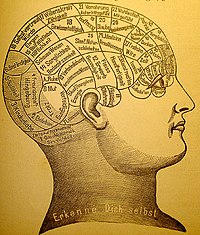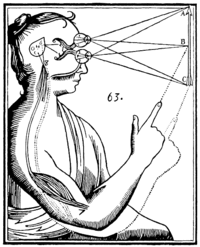心智
心智(英语:mind,亦常稱為心靈)指一系列认知能力组成的总体,这些能力可以让个体具有意识、感知外界、进行思考、做出判断以及记忆事物。心智是人类的特征,但是其它的生物可能也具有心智[3][4]。


很长的时间里面人们都试图从哲学、宗教、心理学和认知科学的角度来试图理解心智究竟是什么,并尝试探究心智的独特性质。围绕心智的本质所产生的问题主要是它与大脑和神经系统的关系,这个问题也构建了心身二分法的观念。心身二分法讨论了心智是否在某一程度上独立于人体的肉体(二元论与唯心主义[5]),而肉体来自于并且可以被认作是包括神经活动在内的物理现象(物理主义),也讨论了心智是不是与我们的大脑以及大脑活动保持一致。另一个问题则讨论是否只有人类才拥有心智,或者是部分或全部动物以及所有生物也拥有心智,或者甚至人造机器也可能拥有心智。
无论心智与肉体的关系究竟如何,人们普遍都认为心智使个体具有主观察觉,并且对其周围环境存在意向性,可以通过一定的媒介感知并回应刺激,同时拥有意识,可以进行思考和感觉[3][6]。
研究心智的著名哲学家包括柏拉图、笛卡儿、莱布尼茨、康德、马丁·海德格尔、约翰·罗杰斯·希尔勒和丹尼尔·丹尼特等人。包括西格蒙德·弗洛伊德和威廉·詹姆士在内的心理学家也从心理学的角度建立了有关人类心智本质的一系列有影响力的理论,以便对心智进行描述和定义。在20世纪晚期和21世纪初期的认知科学领域内,科学家已经建立并发展了多种途径和方法来对心智和与心智有关的现象进行描述。在人工智能领域也开始尝试结合控制论和信息论来对非人类心智存在的可能性进行探索,并尝试研究将人类精神现象在机器上实现的方法。
有关于心智的概念,不同的文化和宗教传统都对其有着不同的理解。有一些认为心智是人类特有的一种特质,而其他则认为动物、神祇以及非生命物体都具有心智(泛心论和泛灵论)。早期的一些记录将心智(有时也被描述为与灵魂和精神相同的东西)与包括来世、宇宙学和自然规律在内的理论联系在一起。这样的例子包括琐罗亚斯德、释迦牟尼、柏拉图、亚里士多德以及其它古希腊、印度和后来伊斯兰与中世纪欧洲哲学家所提出的教义。
词源
编辑古英语中gemynd一词的本意是记忆的能力,而不是通常所指的思想。因此英语中有如call to mind、come to mind、keep in mind、to have mind of等的用法。同时古英语中还有其它表达“心智(mind)”的词语,例如hyge一词的意思为“心智、精神”。
“Memory”一词的含意与古诺尔斯语中munr一词意思相似,为“记忆”之意。这个源起源自原始印欧语的*ménos(意为心智),它来自动词词根*men-,该词根意思为“去思考、去记住”,正因如此拉丁语中的mens一词意思为“心智”,梵语中的मनस्(Manas,意)意思也为“心智”,希腊语中的μένος意思则为“心智、勇气、愤怒”。
心智、大脑同一论
编辑心智、大脑的本体论认为,不管思维还是智力,它们都扎根于大脑,而并不利用、依赖、或与非物质相互作用。尽管如此,大都认为离开大脑的组织来谈论思维的组织,也是合理的,而且认知科学家也并不仅仅是神经科学家。这是根据不同层次的分析来论证。一个认知科学家可以在符号层次上断言说一个推理为正确,而神经科学家则在物理层次上来执行符号层次。
思维
编辑思想脉络,逻辑。 人们在思考问题与答案时,会将过去的经验拿出来做分析、比对。若没有加入其他人的经验和想法,再一次的分析、参考,则到最后所得到的答案,往往和过去是相类似的。
科学研究
编辑神经科学
编辑认知科学
编辑认知科学研究造成信息处理(认知)的心智功能。
心理学
编辑心理学是研究人类行为,心理功能和经验。
相关学说
编辑超心理学
编辑超心理学是研究一些超常现象或者是看起来是超自然的现象的学科[9],这些现象包括预知、念力和心灵感应等。超心理学的英文为Parapsychology,这个词来自于古希腊语para(意思为“超出、其它”)、psyche(意思为“心灵、灵魂”)和logos(意思为“解释”)构成,由德国心理学家玛克斯·德索(Maximilian Dessoir )在1889年左右提出。美国植物学家约瑟夫·莱因(Joseph Banks Rhine)后来普及了超心理学这一概念,并替换了早期所提出的“特异功能研究”一词,同时在研究方法中引入了试验方法来进行研究各类灵异现象[10]。
超心理学是广受争议的一门学科,很多科学家都相信特异功能其实不存在[11][12][13][14][15]。这门学科的科学性被很多科学家质疑[16],他们认为超心理学是一门伪科学[17][18][19]。
参考文献
编辑- ^ Oliver Elbs, Neuro-Esthetics: Mapological foundations and applications (Map 2003), (Munich 2005)
- ^ Descartes, R. (1641) Meditations on First Philosophy, in The Philosophical Writings of René Descartes, trans. by J. Cottingham, R. Stoothoff and D. Murdoch, Cambridge: Cambridge University Press, 1984, vol. 2, pp. 1-62.
- ^ 3.0 3.1 Dictionary.com网络词典: "mind": "1. (in a human or other conscious being) the element, part, substance, or process that reasons, thinks, feels, wills, perceives, judges, etc.: the processes of the human mind. 2. Psychology. the totality of conscious and unconscious mental processes and activities. 3. intellect or understanding, as distinguished from the faculties of feeling and willing; intelligence."
- ^ Google给出的定义: "mind": "The element of a person that enables them to be aware of the world and their experiences, to think, and to feel; the faculty of consciousness.." [1] (页面存档备份,存于互联网档案馆)
- ^ Redding, Paul, "Georg Wilhelm Friedrich Hegel", The Stanford Encyclopedia of Philosophy (Summer 2012 Edition), Edward N. Zalta (ed.), forthcoming. [2] (页面存档备份,存于互联网档案馆). See section "2.1 Background: “Idealism” as understood in the German tradition".[expand reference]
- ^ Oxford American College Dictionary, "mind": "1. the element of a person that enables them to be aware of the world and their experiences, to think, and to feel; the faculty of consciousness and thought."
- ^ OED;etymonline.com (页面存档备份,存于互联网档案馆)
- ^ Eliasmith, Chris; Terrence C. Stewart, Xuan Choo, Trevor Bekolay, Travis DeWolf, Yichuan Tang, Daniel Rasmussen. A Large-Scale Model of the Functioning Brain. Science. 2012-11-30, 338 (6111): 1202–1205 [2013-05-13]. doi:10.1126/science.1225266. (原始内容存档于2015-09-24).
- ^ Parapsychological Association website, Glossary of Key Words Frequently Used in Parapsychology 互联网档案馆的存档,存档日期2010-08-24., Retrieved February 10, 2007
- ^ Encyclopedia of Occultism & Parapsychology edited by J. Gordon Melton Gale Research, ISBN 978-0-8103-5487-6
- ^ Science Framework for California Public Schools. California State Board of Education. 1990.
- ^ Wheeler, J. A. Point of View: Drive the Pseudos Out.... Skeptical Inquirer. 1979, 3: 12–13.
- ^ Kurtz, P. Is Parapsychology a Science?. Skeptical Inquirer. 1978, 3: 14–32.
- ^ Druckman, D. and Swets, J. A. eds. Enhancing Human Performance: Issues, Theories and Techniques. National Academy Press, Washington, D.C. 1988: 22. ISBN 0-309-07465-7.
- ^ Reuters. Telepathy gets academic in Sweden. CNN. 2003-09-05 [2009-03-09]. (原始内容存档于2009-06-28).
Despite decades of experimental research ... there is still no proof that gifts such as telepathy and the ability to see the future exist, mainstream scientists say.
- ^ Flew, Antony. Grim, Patrick , 编. Philosophy of Science and the Occult. 1982.
|contribution=被忽略 (帮助) - ^ Cordón, Luis A. Popular psychology: an encyclopedia. Westport, Conn: Greenwood Press. 2005: 182. ISBN 0-313-32457-3.
The essential problem is that a large portion of the scientific community, including most research psychologists, regards parapsychology as a pseudoscience, due largely to its failure to move beyond null results in the way science usually does. Ordinarily, when experimental evidence fails repeatedly to support a hypothesis, that hypothesis is abandoned. Within parapsychology, however, more than a century of experimentation has failed even to conclusively demonstrate the mere existence of paranormal phenomenon, yet parapsychologists continue to pursue that elusive goal.
- ^ Bunge, Mario. A skeptic's beliefs and disbeliefs. New Ideas in Psychology. 1991, 9 (2): 131–149. doi:10.1016/0732-118X(91)90017-G.
- ^ Blitz, David. The line of demarcation between science and nonscience: The case of psychoanalysis and parapsychology. New Ideas in Psychology. 1991, 9 (2): 163–170. doi:10.1016/0732-118X(91)90020-M.
外部链接
编辑- The Mind is What the Brain Does - National Geographic article.
- Theory of Mind (页面存档备份,存于互联网档案馆) for artificial intelligence.
- 嫉妒,心灵的顽疾 (页面存档备份,存于互联网档案馆)